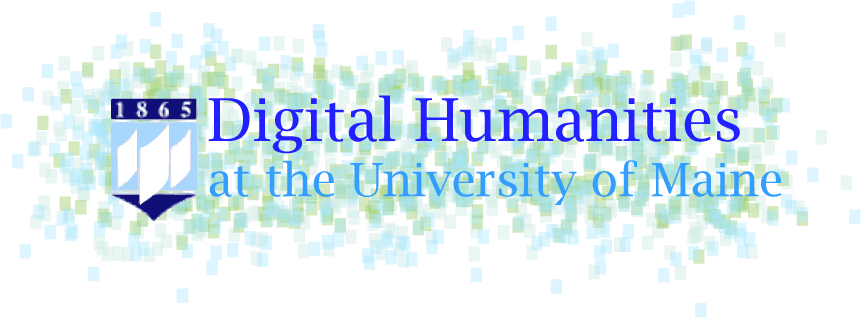Digital Humanities Week, 26-29 September 2011
The 2011 Digital Humanities Week at the University of Maine explores the impact of digital research and publication tools on artistic creation and humanities scholarship. Long a workhorse of the empirical sciences, computing has recently begun to transform the study of the human condition. This series of events will touch on databases and cultural heritage, new publication platforms for scholars, and the up- and downsides of the increasing digitization of society.
Online discussion
Accompanying the live events will be a continuously updating Web site that enables audience members to converse in advance with presenters and with each other during the events. These remarks will be re-presented by the organizers as additional questions and comments at the end of each presentation.
For more information
Rooms and other schedule details are subject to change. For the online discussion and more details, please visit DigitalHumanities.NMDprojects.net or call 207 581-4477.
Schedule of events
v1.7, updated 21 Sep 2011
Monday, Sept. 26
Many-To-Many Engagement in the Digital Humanities
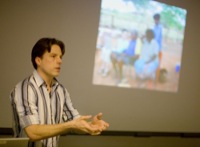 10-10:50am, Bangor Room, Memorial Union (Q&A from 10:50-11:30am)
10-10:50am, Bangor Room, Memorial Union (Q&A from 10:50-11:30am)
Craig Dietrich (Institute for Multimedia Literacy, University of Southern California) argues for community engagement as a natural outgrowth of creators working with digital tools and networks. His examples range from citizen journalism to guerilla gardening to hacking Google Earth. Sponsored by the New Media Department and University of Maine Humanities Initiative.
Digital Methods for Authors and Curators
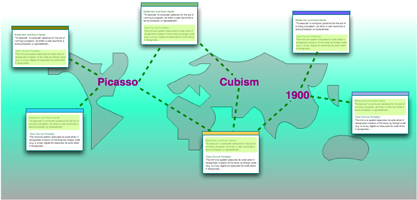 12-1:30pm, FFA Room, Memorial Union
12-1:30pm, FFA Room, Memorial Union
This workshop will introduce participants to cutting-edge strategies in the Digital Humanities, with a focus on cross-linking humanities archives and scholarship. Participants may choose to explore hands-on techniques or discuss their implications for traditional authors and curators. The workshop will be led by Candace Kanes (Maine Memory Network/Maine Historical Society) and Craig Dietrich (IML/USC). Sponsored by the Digital Curation program and University of Maine Humanities Initiative.
Taking History to Cyberspace: Maine Memory Network and Public History
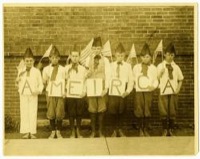 3:15-4:30pm, Hill Auditorium, Barrows Hall
3:15-4:30pm, Hill Auditorium, Barrows Hall
Candace Kanes (Maine Historical Society) demonstrates how the Maine Memory Network enables historical societies, libraries, and other cultural institutions across the state to upload, catalog, and manage digital copies of items from their collections into a single Web-accessible database. Part of the History Department Symposium Lecture Series, co-sponsored by the University of Maine Humanities Initiative.
Tuesday, Sept. 27
Social media and sustainability
5-7pm at 5 Chapel Road; 7-9pm at 42 Mill Street
Joline Blais, Claudia Lowd, gkisedtanamoogk, and Craig Dietrich lead local growers and media activists in a discussion about how social networks can support edible backyards and local farmers. Projects presented include LongGreenHouse, a living/learning center based on the Wabanaki Longhouse model and permaculture design principles, including a multi-age school, a UMaine journeyperson program, and Native elders all under one roof. Also featured will be LA Green Grounds, a grass-roots gardening initiative in Los Angeles that has become a YouTube phenomenon. The event begins with a tour of permaculture gardens at the south edge of campus at 5 Chapel Rd., followed by a potluck at an urban garden site at 42 Mill St. in downtown Orono. For more information contact Joline Blais on First Class. Sponsored by Still Water.
Wednesday, Sept. 28
Scalar: Transforming Media Scholarship
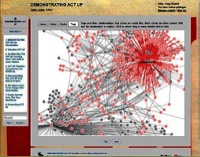 9:30am-noon, Still Water lab, 422 Chadbourne Hall
9:30am-noon, Still Water lab, 422 Chadbourne Hall
Craig Dietrich (IML/USC) explains why Scalar was built to overcome the limitations of current publishing software such as WordPress. Dietrich demos Scalar features like live notes, code annotations, semantic output, and graphical visualization. Sponsored by the New Media Department and University of Maine Humanities Initiative.
Thursday, Sept 29
Social Communication in the Twitter Age
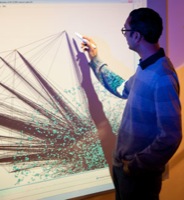 3:30-4:15pm, with Q&A and refreshments to follow, DPC 115
3:30-4:15pm, with Q&A and refreshments to follow, DPC 115
Dhiraj Murthy, Assistant Professor of Sociology at Bowdoin College, speaks on the influence of Twitter and similar social networks on contemporary politics and communication. For more information contact Laurie Cartier on FirstClass or 581-2380 or visit umaine.edu/sociology. Sponsored by the Department of Sociology.
Publishing Post-Gutenberg
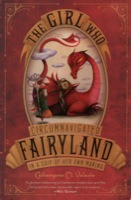 4:30-6pm, 227 Neville Hall
4:30-6pm, 227 Neville Hall
Margery Irvine (Dept. of English) moderates a debate on the merits of digital media for authors. Speakers include best-selling fiction and poetry author Catherynne M. Valente, Marshall McLuhan scholar Paul Grosswiler (Communications and Journalism Department), and digital narrative specialist Joline Blais (New Media Department). Part of the Maine Writers Series, cosponsored by the Department of English and the Lloyd H. Elliot Fund.
Biographies
Joline Blais
Joline Blais, Associate Professor of New Media at UMaine, co-directs Still Water, and co-founded LongGreenHouse. Her book At the Edge of Art (2006) investigates how new media art puts the power of networks and distributed creativity into the hands of ordinary citizens in a variety of non-art contexts. Blais' publications and creative work explore the overlap of digital culture, indigenous culture and permaculture. LongGreenHouse (2007-2011), weaves the Wabanaki Longhouse, permaculture gardens, and networked collaboration into a hybrid "communiversity." This cross-cultural braid articulates tribal and networked alternatives to our hierarchic (and failing) economic and political structures, and seeds the re-emergence of the "commons" in multiage learning communities. She has been expanding this work from the university to community contexts as a partner and member Belfast Cohousing & Ecovillage, and as a member of Orono and Belfast Transition Town Initiatives.
Craig Dietrich
Craig Dietrich teaches Institute for Multimedia Literacy scholarly multimedia and digital studies classes at USC and develops systems for creative and scholarly examinations of transnational culture. His offline production includes gallery-based airports, mall storefronts, and artificial ecosystems (recently presented with Vanessa Vobis at ArtSpace404, Santa Rosa) and curated events (“The Network of Ecology” series at USC). Online collaborations include the Mukurtu Archive and Plateau Peoples Web Portal content manager based on Aboriginal cultural protocols; ThoughtMesh, a folksonomic online publishing system; the Dynamic Backend Generator, a MySQL-based relational data writing canvas; and Scalar, a new media studies platform based on semantic web technology. He is presently in production of Magic, a documentary about humanist-programmer collaborations. His presentations and papers are situated at the intersection of trans-nationalism, corporate hierarchies, and local economies, having compared prevalent database paradigms to big-box retail chains, linked Batailles Formlessness to RSS feeds, and championed custom, agile software over large content management systems for digital humanities production.
Paul Grosswiler
Paul Grosswiler is Chair of the Department of Communication and Journalism at the University of Maine. He is a Fulbright Senior Specialist who teaches History of Mass Communication, International Mass Communication and Media Ethics, Media History, Media Ecology and Media Cultures and Expression. He has published a dozen journal articles and book chapters. Grosswiler also regularly teaches in the Honors College, including a course on Taoism and Tai Chi, and has been a Fulbright Senior Scholar in Communication and Journalism at Wuhan University in China. He has presented research papers at more than twenty national and international professional conferences, including the Association for Education in Journalism and Mass Communication, the International Communication Association, the Canadian Communication Association, and the Annual Conference of Cuban and North American Philosophers.
Candace Kanes
Candace Kanes is the editor and curator of the site and author of a number of the exhibits that accompany the essays. She has worked at the Maine Historical Society as curator/historian for Maine Memory Network since 2003. She holds a Ph.D. in modern American history from the University of New Hampshire and a master's in American and Women's Studies from the State University of New York at Buffalo. Among her publications are "Serious and Ambitious Career Women: The Portland Business and Professional Women's Club in the 1920s" in Marli F. Weiner, ed., Of Place and Gender, Women in Maine History (Orono: University of Maine Press, 2005); and "Revisiting Main Street: Uncovering Women Entrepreneurs," in Polly Welts Kaufman and Katharine T. Corbett, eds., Her Past Around Us: Interpreting Sites for Women’s History (Malabar, Florida: Kreiger Publishing Co., 2003). She has taught history, American studies and women's studies at Bates College, the University of New England, University of Southern Maine, and Maine College of Art. She is a former newspaper editor and reporter and has worked at The Times Record in Brunswick and the Lewiston Sun-Journal and at newspapers in Ohio.
Dhiraj Murthy
Dhiraj Murthy's current research explores social networking cyberinfrastructure and virtual organizations. His work on social networking technologies in virtual breeding grounds is funded by the National Science Foundation, Office of CyberInfrastructure. Murthy also has a book on Twitter under contract with Polity Press. He has done virtual ethnographic work and published articles both on his research findings as well as his innovative digital ethnographic research methods. Murthy founded and currently directs the Social Network Innovation Lab, an interdisciplinary research group investigating social networks and virtual organizations. His publications include "Twitter: Microphone for the Masses," "New Media and Natural Disasters: Blogs and the 2004 Indian Ocean tsunami," and "Muslim Punks Online: A diasporic Pakistani music subculture."
Catherynne M. Valente
Catherynne M. Valente is a New York Times Bestselling author of fantasy and science fiction novels, short stories, and poetry. She has written over a dozen volumes of fiction and poetry since her first novel, The Labyrinth, was published in 2004. Her full-length novels include Palimpsest, The Habitation of the Blessed, and Deathless. Her poetry and short fiction can be found online and in print; she has been nominated for the Hugo (2010), Locus (2010 & 2011) and World Fantasy Awards (2007 & 2009) and won numerous other honors including the Million Writers Award for best online short fiction. In 2010, The Girl Who Circumnavigated Fairyland in a Ship of Her Own Making became the first self-published work to win a major literary award, winning the Andre Norton Award for YA literature before it saw print in 2011, going on to become a national bestseller.
Digital Humanities Week is sponsored by the departments of English, History, New Media, and Sociology, with support from the University of Maine Humanities Initiative and Digital Curation program. Web and print design by Still Water.
